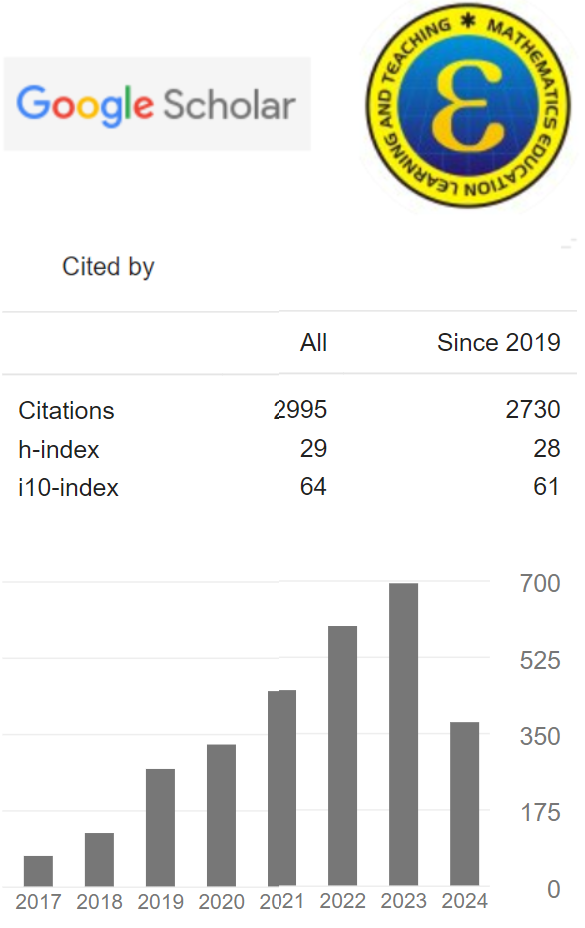Description of Mathematical Critical Thinking Skills for Vocational High School Students during the COVID-19 Pandemic
(1) Singaperbangsa University of Karawang
(2) Singaperbangsa University of Karawang
(*) Corresponding Author
Abstract
The Pandemic period made mathematics less understood by students, especially vocational students. Because of that, describing mathematical critical thinking skills need to be done so that teachers can improve the approach or learning method. This research aims to describe the essential skills of thinking of 10th-grade vocational high school students on the content of quadratic equations and functions. This type of research is descriptive quantitative research. The subjects in this study consisted of 25 students of SMK Negeri 1 Karawang grade 10 to determine the sample using the purposive sampling technique. The test instrument collected the research data in three validated description questions. This research indicates that students' critical thinking skills implemented through web-based learning media at SMK Negeri 1 Karawang are “moderate categoryâ€. The final test results among 25 respondents consisted of three students within “high categoryâ€, seventeen students within “medium categoryâ€, and five students within “low categoryâ€. Moreover, the students’ percentage level on critical thinking skills having 55% was deemed within “moderate categoryâ€. The conclution is that the respondents' mathematical critical thinking skills are in the moderate category, so it is hoped that educators can improve the students' critical thinking skills by using learning methods, learning media, and teaching materials
Keywords
Full Text:
PDFReferences
Agustina, I. (2020). Efektivitas pembelajaran matematika secara daring di era pandemi COVID-19 terhadap kemampuan berpikir kreatif. Universitas Negeri Medan.
Asmarawati, N. I. (2018). Deskripsi kemampuan berpikir kreatif dan kritis siswa SMP kelas viii semester genap. Prosiding Seminar Nasional Etnomatnesia, 690–697.
Batilantes, S. (2021). Project VLOGI (Video Lectures on Giving Instructions): Effects on learners’ performance in probability and statistics. International Journal of Educational Studies in Mathematics, 8(4), 299–315. https://doi.org/10.17278/ijesim.1004076
Crismasanti, Y. D., & Yunianta, T. N. H. (2017). Deskripsi kemampuan berpikir kritis siswa kelas VII SMP dalam menyelesaikan masalah matematika melalui tipe soal open-ended pada materi pecahan. Satya Widya, 33(1), 73. https://doi.org/10.24246/j.sw.2017.v33.i1.p73-83
Etikan, I. (2016). Comparison of convenience sampling and purposive sampling. American Journal of Theoretical and Applied Statistics, 5(1), 1–4. https://doi.org/10.11648/j.ajtas.20160501.11
Fauzy, A., & Nurfauziah, P. (2021). Kesulitan pembelajaran daring matematika pada masa pandemi COVID-19 di SMP muslimin cililin. Jurnal Cendekia : Jurnal Pendidikan Matematika, 5(1), 551–561. https://doi.org/10.31004/cendekia.v5i1.514
Hakim, R. T. Y. Al. (2021). Pembelajaran online di tengah pandemi COVID-19. tantangan yang mendewasakan (1st ed.). UAD Press.
Janah, S. R., Suyitno, H., & Rosyida, I. (2019). Pentingnya literasi matematika dan berpikir kritis matematis dalam menghadapi abad ke-21. PRISMA, Prosiding Seminar Nasional Matematika, 2, 905–910.
Kharisma, E. N. (2018). Analisis kemampuan berpikir kritis matematis siswa SMK pada materi barisan dan deret. JRPM (Jurnal Review Pembelajaran Matematika), 3(2), 62–75. https://doi.org/10.22460/jpmi.v1i4.p559-568
Maya, F. A., Sari, I. K., & Zanthy, L. S. (2019). Analisis kemampuan berpikir kreatif, berpikir kritis matematik siswa SMK pada materi SPLDV. JPMI (Jurnal Pembelajaran Matematika Inovatif), 2(4), 167. https://doi.org/10.22460/jpmi.v2i4.p167-176
Nuryanti, L., Zubaidah, S., & Diantoro, M. (2016). Analisis kemampuan berpikir kritis siswa kelas ix. Prosiding Konferensi Nasional Penelitian Matematika dan Pembelajarannya, 2006, 179–186.
Oktaria, R. (2019). Pengaruh model pembelajaran berbasis masalah terhadap kemampuan berpikir kritis matematis siswa SMP taman siswa medan T.P. 2019/2020. Universitas Muhammadiyah Sumatra Utara Medan.
Putri, Effendi, & Kusumawardana. (2019). Upaya peningkatan soft dan hard skill siswa SMK. Jurnal Pemberdayaan Masyarakat Berkarakter, 2(1), 1–10.
Putria, H., Maula, L. H., & Uswatun, D. A. (2020). Analisis proses pembelajaran dalam jaringan (daring) masa pandemi COVID- 19 pada guru sekolah dasar. Jurnal Basicedu, 4(4), 861–870. https://doi.org/10.31004/basicedu.v4i4.460
Ridha, M., Marwan, & Ansari, B. . (2019). Peningkatan kemampuan berpikir kritis matematis siswa SMK melalui pendekatan matematika realistik. Jurnal Peluang, 7(2), 34–43. https://doi.org/10.24815/jp.v7i2.13745
Roysa, M., & Hartani, A. (2020). Aplikasi daring quizziz sebagai solusi pembelajaran menyenangkan di masa pandemi. Lentera: Jurnal Ilmiah Kependidikan, 13(2), 315–326. https://doi.org/10.52217/lentera.v13i2.650
Spitzer, M. W. H., & Musslick, S. (2021). Academic performance of K-12 students in an online-learning environment for mathematics increased during the shutdown of schools in wake of the COVID-19 pandemic. PLOS ONE, 16(8), 1–16. https://doi.org/10.1371/journal.pone.0255629
Sudiarta, Diputra, Nayun, & Sutanaya. (2021). Efektivitas pembelajaran matematika secara daring di masa pandemi COVID -19 terhadap kemampuan berfikir kritis siswa. Suluh Pendidikan, 19(1), 29–44.
Sulistiani, E., & Masrukan. (2016). Pentingnya berpikir kritis dalam pembelajaran matematika untuk menghadapi tantangan MEA. Seminar Nasional Matematika X Universitas Semarang 2016, 605–612.
Widyastuti, W., Setiawati, S., & Triana, M. (2020). The impact of online learning through students’ mathematical habit of mind. Eduma : Mathematics Education Learning and Teaching, 9(2), 37–41. https://doi.org/10.24235/eduma.v9i2.7156
Zakaria, P., Nurwan, N., & Silalahi, F. D. (2021). Deskripsi kemampuan berpikir kritis siswa melalui pembelajaran daring pada materi segi empat. Euler : Jurnal Ilmiah Matematika, Sains Dan Teknologi, 9(1), 32–39. https://doi.org/10.34312/euler.v9i1.10539
DOI: 10.24235/eduma.v11i1.10001
Article Metrics
Abstract view : 28 timesPDF - 4 times
Refbacks
- There are currently no refbacks.
Copyright (c) 2022


.png)










